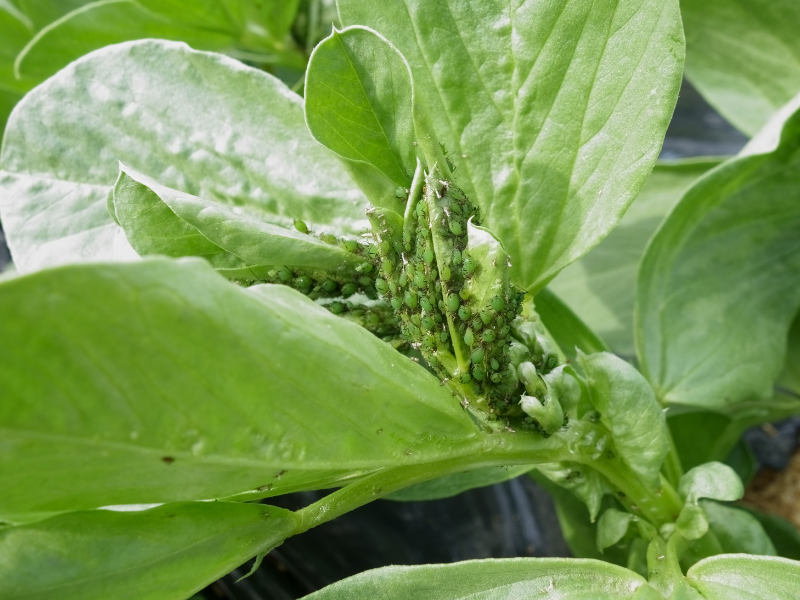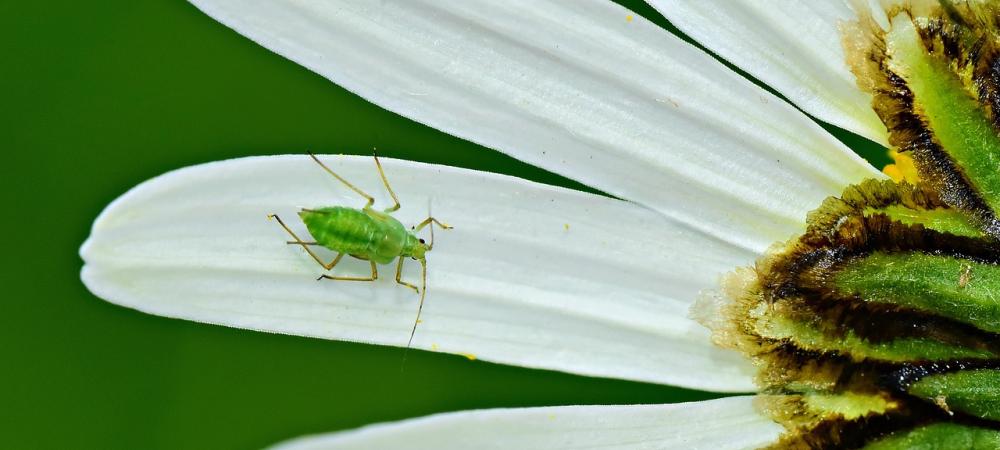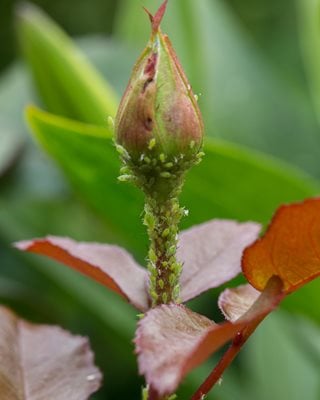Roses are admired worldwide for their stunning appearance, delightful fragrance, and graceful charm, often serving as the focal point in many gardens. However, these beloved blooms face a persistent threat from aphids—minute, sap-feeding insects that can distort leaves, hinder growth, and spread plant diseases. Although chemical pesticides can manage aphid infestations, they frequently damage beneficial insects and upset the garden’s natural balance. A greener, more eco-friendly approach is companion planting. Certain plants naturally deter aphids, lure their natural predators, or foster a healthier environment for roses to flourish. This guide highlights five companion plants that effectively keep aphids at bay, detailing their mechanisms, planting advice, and the broader benefits they bring to your garden’s ecosystem.
Why Companion Plants Are Effective Against Aphids

Companion planting harnesses the power of natural plant traits and ecological relationships:
- Deterring pests: Some plants emit strong aromas or chemicals that aphids find unappealing, helping to protect roses.
- Attracting helpful insects: Plants like dill, fennel, and yarrow draw in ladybugs, lacewings, and parasitic wasps, all of which prey on aphids.
- Concealing rose scents: Aromatic companion plants can confuse aphids, making it difficult for them to locate rose bushes.
- Boosting plant vitality: Well-maintained, properly spaced, and stress-free roses are less prone to aphid attacks.
By pairing roses with the right companions, gardeners can naturally reduce aphid numbers while enhancing biodiversity.
1. Garlic: A Potent Aphid Deterrent

Garlic stands out as one of the most powerful natural repellents against aphids. Its pungent aroma masks the scent of roses and discourages many soft-bodied pests.
- Repels aphids and mites: Sulfur compounds in garlic interfere with aphid feeding and reproduction.
- Enhances soil health: Garlic roots release substances that help suppress harmful soil pathogens.
- Low-maintenance growth: Thrives in most garden soils with minimal care.
Planting Tips:
- Place garlic cloves around rose bushes, spacing them about 6 inches apart to allow bulb development.
- Harvest in late summer or leave cloves in place to maintain ongoing aphid protection.
2. Chives: A Gentle Yet Effective Guardian
Chives, a fragrant perennial herb, complement roses beautifully.
- Naturally repels aphids: Their mild onion-like scent confuses and deters aphids.
- Attracts beneficial insects: Flowers draw bees, hoverflies, and parasitic wasps.
- Supports soil health: Chives improve microbial diversity, benefiting rose roots.
Planting Tips:
- Plant chives in clusters around rose beds.
- Allow some chive plants to flower to attract pollinators.
- Regularly trim chives to promote fresh growth and improve air circulation near roses.
3. Marigolds: Bright and Bold Pest Defenders
Marigolds are renowned for their vivid blooms and their ability to repel various garden pests, making them a vibrant addition to rose gardens.
Marigolds: Natural Pest Guardians and Garden Beautifiers
- Deter Aphids and Nematodes – The chemical compounds found in marigold roots and foliage act as a natural repellent, keeping these pests away from your roses.
- Lure Beneficial Predators – Marigolds attract helpful insects like ladybugs and lacewings, which prey on aphids, reducing their numbers naturally.
- Enhance Garden Aesthetics – Their vivid, cheerful flowers provide a stunning contrast that complements rose bushes beautifully.
Planting Recommendations:
- Surround rose beds with French or dwarf marigolds to form a protective border.
- Space marigolds evenly among roses to establish ongoing pest defense.
- Regularly deadhead spent blooms to promote fresh flowering and maintain pest-repelling effectiveness.
Nasturtiums: Vibrant Trap Crops and Pest Deterrents
- Aphid Trap Crop – Nasturtiums attract aphids away from roses, sparing your prized plants from infestation.
- Repel Cucumber Beetles and Other Pests – Their distinctive peppery aroma confuses and deters various soft-bodied insects.
- Support Pollinators – Bright, nectar-rich blossoms draw bees and hoverflies, which indirectly benefit rose health.
Planting Tips:
- Position nasturtiums close to roses but allow their trailing vines to grow without overwhelming the shrubs.
- Prune aggressively if needed to prevent overcrowding.
- Plant multiple varieties to ensure continuous blooms and sustained pest control.
Fennel: Attracting Aphid Predators for Rose Protection
- Draws Beneficial Insects – Fennel flowers attract parasitic wasps, ladybugs, and lacewings, all of which feed on aphids.
- Promotes Garden Biodiversity – Incorporating fennel helps create a balanced ecosystem that naturally curbs pest outbreaks.
- Boosts Rose Vitality – The presence of fennel contributes to overall garden health and stability.
Planting Advice:
- Place fennel at the edges of rose beds to prevent its large leaves from shading the roses.
- Allow some fennel plants to flower, as their blooms are crucial for attracting helpful insects.
- Thin out plants regularly to maintain good airflow and avoid overcrowding.
Additional Strategies for Aphid-Free Roses
- Ensure Proper Spacing – Provide ample room between roses and companion plants to enhance air circulation and reduce fungal risks.
- Conduct Regular Inspections – Check leaves and buds weekly to catch aphid infestations early.
- Water Wisely – Keep roses well-hydrated to strengthen their natural defenses against pests.
- Prune Effectively – Remove any infested or damaged shoots promptly to limit aphid reproduction.
- Encourage Beneficial Insects – Maintain a diverse array of flowering companions to attract and sustain predator populations year-round.
Common Pitfalls to Avoid
- Overcrowding Companion Plants – Excessive planting can restrict airflow and increase mildew susceptibility.
- Neglecting Bloom Timing – Some pest-repelling benefits depend on flowers attracting predators at the right time.
- Planting Incompatible Species – Avoid herbs or flowers that aggressively compete with roses for nutrients.
- Relying Solely on Companions – While companion plants help reduce aphids, they don’t replace the need for vigilant monitoring and care.
Final Thoughts
Aphids often pose a persistent problem for rose enthusiasts, yet nature offers graceful, eco-friendly remedies. Incorporating plants like garlic, chives, marigolds, nasturtiums, and fennel near your roses can naturally deter pests, lure helpful insects, and foster a vibrant garden ecosystem. Companion planting goes beyond mere pest management—it enriches biodiversity, boosts soil vitality, and helps cultivate a more flourishing and visually captivating rose garden. With mindful planting choices, consistent upkeep, and strategic care, your roses can thrive with lush, colorful blooms, free from aphid harm and with minimal reliance on chemicals. Achieving success hinges on balance: proper spacing, adequate sunlight, sufficient watering, and selecting the right companions all play vital roles in nurturing a thriving garden. Supported by these five companion plants, your roses will grow healthier, more resilient, and your garden will radiate natural beauty.
Roses and Aphids
- Roses are prized for beauty but vulnerable to aphids, which damage leaves, stunt growth, and spread disease.
- Chemical sprays harm beneficial insects; companion planting offers a sustainable alternative.
Why Companion Plants Work
- Repel aphids with strong scents or chemicals.
- Attract beneficial insects like ladybugs and parasitic wasps.
- Mask rose scent to confuse aphids.
- Improve rose health by reducing stress and promoting airflow.
Top 5 Companion Plants for Roses
-
Garlic
- Repels aphids and mites via sulfur compounds.
- Enhances soil health by suppressing pathogens.
- Easy to grow; plant cloves 6 inches apart around roses.
-
Chives
- Mild onion scent deters aphids.
- Attracts pollinators and beneficial insects.
- Improves soil microbial diversity.
- Plant in clusters; leave flowers to attract pollinators.
-
Marigolds
- Repel aphids and nematodes with root and leaf compounds.
- Draw predatory insects like ladybugs.
- Add bright color to garden.
- Plant around rose bed edges; deadhead regularly.
-
Nasturtiums
- Act as trap crops, attracting aphids away from roses.
- Repel other pests with peppery scent.
- Support pollinators with nectar-rich flowers.
- Plant near roses; prune to prevent overcrowding.
-
Fennel
- Attracts aphid predators such as parasitic wasps.
- Enhances garden biodiversity and rose growth.
- Plant at bed edges; allow flowers to bloom.
Additional Tips
- Space plants for good airflow.
- Monitor roses weekly for aphids.
- Water properly to reduce stress.
- Prune infested shoots promptly.
- Maintain diverse flowering plants to support predators.
Common Mistakes
- Avoid overcrowding companions.
- Consider bloom timing for predator attraction.
- Prevent competition by choosing compatible plants.
- Don’t rely solely on companions; continue monitoring.
Conclusion
- Companion planting with garlic, chives, marigolds, nasturtiums, and fennel naturally controls aphids.
- This method supports biodiversity, soil health, and rose vitality.
- Balanced care—spacing, watering, pruning—ensures thriving, pest-resistant roses.
